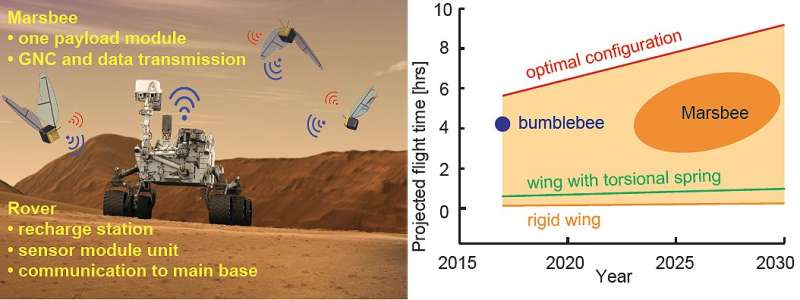April 3, 2018 report
NASA funds project to study feasibility of using robot bees to study Mars from a new perspective

NASA has announced that it has awarded funding to a combined team of researchers from the University of Alabama and an unnamed team in Japan for development of a new kind of Mars explorer. The project team has been awarded $125,000 to develop what NASA calls Marsbees—a swarm of robot bees that could fly in the thin Martian atmosphere and deliver information from their sensors.
NASA's rover project has by all accounts been a massive success, but it has had one limitation—the rovers all travel very slowly on land, making it difficult for them to survey much territory. Swarms of robot bees, on the other hand, could fan out from a base and explore the surface below from a wide range of perspectives.
In its announcement, NASA describes the Marsbees as about the size of a bumblebee, but with bigger wings—approximately the size of a cicada. Officials at the agency are interested in determining if flapping might be a better option than fixed wing configurations or rotors. They note that the Japanese group has demonstrated expertise in developing robots that fly using flapping wings and has even demonstrated one that actually works—the hummingbird micro-air vehicle (MAV).
NASA envisions a lander similar in some ways to a rover serving as a base for the Marsbees. The robotic bees could launch from it and then return to recharge their batteries—they would send back sensor data while flying using Wi-Fi. The project is still in the very early stages, of course. It is one of 25 research projects funded as NASA continues to study the Red Planet amid plans to send humans there.
In the meantime, the researchers building and testing the Marsbees will have their hands full. They will need to show that such micro-bots can fly well in the Martian skies, perhaps autonomously, and carry useful sensors. They will also likely require a means of cleaning dust from their bodies and wings. NASA notes that it expects such research to take around a decade to prove their feasibility, though they acknowledge that not all of them will pan out. Only those showing promise will make it to phase II.
© 2018 Phys.org



















